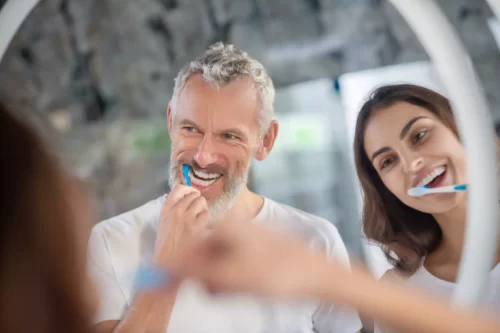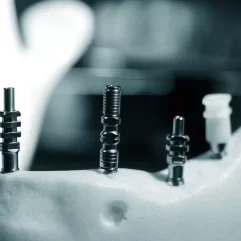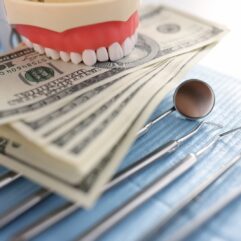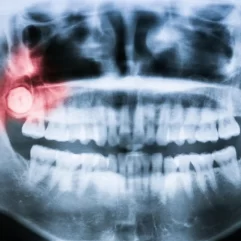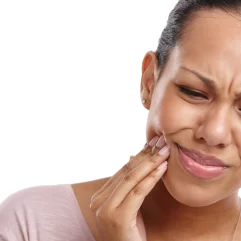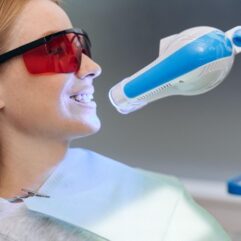When it comes to your health, a dazzling smile is often the first impression you make; but maintaining it goes far beyond just aesthetics. Healthy teeth and gums are crucial not only for confidence but also for overall well-being.
We’ve compiled 25 tips for teeth and gum care that will keep your mouth healthy and vibrant. Let’s dive in!
How Should I Care for My Teeth and Gums?
Effectively maintaining your oral health isn’t rocket science, but it’s also something significant enough to not be dismissed entirely. Complications such as periodontal disease, gingivitis, plaque buildup, and gum recession can often be prevented by maintaining a consistent and comprehensive oral hygiene routine.
There are 5 simple aspects of teeth and gum care:
- Brushing
- Flossing
- Rinsing
- Healthy Diet
- Dental Check-ups
Tips for Brushing Your Teeth and Gums
Proper brushing of your teeth and gums is essential for maintaining good oral hygiene. Not only does it help remove food particles and bacteria, but it also promotes healthy gums and prevents tooth decay. Here are some important tips for brushing your teeth and gums to ensure optimal dental care:
- Choose the Right Toothbrush: The first step in proper brushing is choosing the right toothbrush. It should have soft bristles and a comfortably-sized head that can reach all areas of your mouth easily. If you have sensitive teeth or gum disease, consider using an electric toothbrush as it provides a gentle yet thorough cleaning.
- Use Fluoride Toothpaste: When selecting a toothpaste, make sure it contains fluoride – a mineral that strengthens enamel and protects against cavities. Fluoride also helps reverse early stages of tooth decay by strengthening weakened areas of the enamel.
- Brush Twice a Day: Dentists recommend brushing your teeth at least twice a day – morning and night – for two minutes each time. This ensures that you are removing plaque buildup from your teeth before it hardens into tartar, which can lead to gum disease.
- Proper Technique: Many people tend to brush their teeth quickly without paying attention to their technique, resulting in ineffective cleaning. For properly teeth, hold your toothbrush at a 45-degree angle towards the gum line and use small circular motions to clean each tooth thoroughly.
- Don’t Forget Your Tongue: Bacteria can accumulate on your tongue as well, leading to bad breath and other oral health issues. Make sure to gently brush or scrape your tongue with a tongue scraper after brushing your teeth.
- Floss Daily: While brushing helps remove plaque from the surfaces of our teeth, flossing is essential for removing food debris from between them where brushes cannot reach easily.
- Be Gentle with Your Gums: Be careful not to brush your gums too hard as it can lead to gum recession and sensitivity. Instead, use gentle pressure and a soft-bristled toothbrush.
- Replace Your Toothbrush Regularly: Over time, the bristles of your toothbrush can become worn out, making them less effective in cleaning your teeth. It is recommended to replace your toothbrush every three months or when the bristles start to fray.
Tips for Flossing Your Teeth
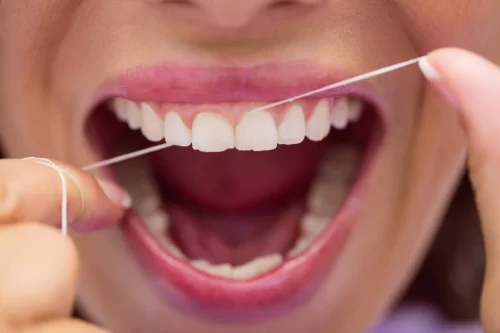
Flossing is an essential part of oral hygiene that doesn’t get the credit it deserves. It’s crucial to make flossing a daily ritual to promote healthy gums and fresh breath. How to floss, you ask? Here are some tips for effective flossing:
- Choose the right type of floss: There are many types of dental floss available in the market, such as waxed, unwaxed, flavored, and wide floss. Experiment with different types to find one that suits you best.
- Use enough length: You should have around 18 inches (45 cm) of floss to work with while cleaning your teeth. This ensures you have enough clean floss to use for each tooth.
- Be gentle: Avoid snapping or forcing the floss between your teeth as it can damage your gums or cause bleeding. Instead, gently slide the floss back and forth using a sawing motion.
- Reach all areas: When starting with a new section of floss, make sure you wrap it around each side of the tooth in a C-shape motion to reach all surfaces thoroughly.
- Don’t forget the back teeth: Many people neglect their molars while flossing because they are harder to reach. These back teeth are just as important as others and need proper care too!
- Take your time: Flossing should take about two minutes if done correctly. Don’t rush through it!
Tips for Rinsing Your Teeth & Gums

Properly rinsing your teeth and gums is an essential part of maintaining good oral hygiene and for gum disease prevention. It helps to remove any leftover food particles, plaque, and bacteria that may be lingering in your mouth after brushing and flossing. Here are tips to effectively rinse your teeth and gums:
- Use the Right Technique: The correct way to rinse is by swishing the water around in your mouth for 30 seconds before spitting it out. Avoid vigorously gargling or using too much force as it may cause harm to your teeth and gums.
- Choose the Right Mouthwash: Mouthwashes are a great addition to your oral care routine as they not only freshen up your breath but also help to kill harmful bacteria in your mouth. However, it is important to choose the right type of mouthwash for your specific needs. If you have sensitive teeth or gums, opt for an alcohol-free or gentle formula.
- Time Your Rinse: After brushing and flossing, wait at least 30 minutes before using a mouthwash so that the fluoride from toothpaste can do its job without being washed away too soon.
- Don’t Forget Your Tongue: Many people neglect their tongue when rinsing their mouths, but it’s just as important as cleaning your teeth and gums. Bacteria thrives on the surface of our tongues, leading to bad breath and other oral health issues. Use a tongue scraper or gently brush your tongue while rinsing for a thorough clean.
- Be Consistent: Consistency is key when it comes to any aspect of dental care, including rinsing your teeth and gums regularly. Additionally, if you suffer from any dental issues such as gum disease or bad breath, it is recommended to rinse after every meal.
- Consider Supplemental Rinsing Products: There are various supplementary rinsing products available in the market that can enhance your oral care routine. These include fluoride rinses, antibacterial mouthwashes, and remineralizing solutions that can help strengthen your teeth and prevent cavities.
Tips for a Healthy Diet

When it comes to maintaining healthy teeth and gums, what we eat plays a crucial role, which is why it is essential to pay attention to what we eat:
- One of the most important nutrients for maintaining strong teeth and preventing tooth decay is calcium. Incorporating calcium-rich foods such as milk, cheese, yogurt, leafy greens, and almonds into our diet can help strengthen our teeth and prevent cavities. Calcium helps rebuild the enamel of our teeth and neutralize acids that can cause tooth decay.
- Vitamin D is also vital for healthy teeth as it helps in the absorption of calcium by the body. Foods like fatty fish, egg yolks, fortified cereals are excellent sources of Vitamin D. Another mineral that plays a significant role in dental health is phosphorus. It works together with calcium to keep our teeth strong and healthy. Foods like meat, poultry, fish, dairy products are excellent sources of phosphorus.
- Avoid excessing intake of sugary foods like candies, sodas, and cakes to minimize the production of acids that attack the teeth’s enamel. Similarly, starchy foods like chips or crackers break down into sugars when chewed leading to increased acid production in the mouth.
- Limit your intake of acidic food and drinks as they can erode tooth enamel over time if consumed frequently. Acidic foods include citrus fruits like oranges or grapefruits while acidic drinks include soft drinks or sports drinks.
- Incorporate fibrous fruits and vegetables into your diet. Fruits like apples, carrots, celery, and cucumbers act as natural toothbrushes, scrubbing away any plaque or food particles on the surface of our teeth.
Tips for Dental Check-Ups
Regular dental check-ups are an essential part of maintaining good oral health. While most people may only visit the dentist when they are experiencing pain or discomfort, it is recommended to have a dental check-up at least twice a year, even if you have no noticeable problems with your teeth and gums. These routine visits allow dentists to detect any potential issues early on and prevent them from becoming more serious and costly problems.
Explore affordable dental services in Mexico with Beyond Borders Dental.


